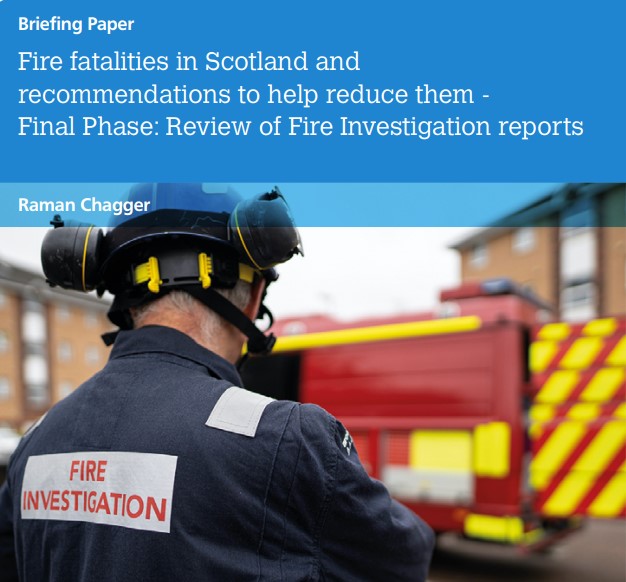Fire fatalities in Scotland
Contents |
[edit] Introduction
The research entitled Fire fatalities in Scotland and recommendations to help reduce them – Final Phase: Review of Fire Investigation reports has led to a number of recommendations that, if implemented, would be expected to result in a reduction in fire fatalities.
[edit] Investigative reports
This final phase of collaborative research study investigating fire fatalities in domestic dwellings in Scotland involved a comprehensive qualitative and quantitative review of Fire Investigation reports. The reports, generated from 126 fires over a four-year period, were produced and supplied by Scottish Fire and Rescue Service (SFRS).
The stakeholder group, comprising the Fire Industry Association, SFRS, Scottish Government and BRE Global, reviewed the Fire Investigation reports. A number of recommendations have resulted that are aimed at different groups including care package suppliers, manufacturers of electronic equipment, public services (NHS, carers, social workers, police, SFRS), the general public and researchers.
[edit] Greater role for technology
The findings demonstrate that whilst new and emerging technologies may provide additional protection in the future, the greater use of existing technologies could be applied immediately and would be expected to save lives. Some of these include providing inter-linked smoke alarms in bedrooms and living spaces, the greater use of the certified watermist systems and greater communication of agencies, neighbours and relatives with the SFRS when an at-risk person has been identified.
Two key areas for warranting further research were proposed which were an experimental investigation of the common electrical items involved in starting fires and a demonstration of the effectiveness of current approved suppression strategies.
The briefing paper ends with an example concept strategy intended for Fire and Rescue Services to assist with the risk classification of vulnerable individuals and proposes solutions that would provide appropriate levels of life safety protection. The findings may be of use to fire and rescue services generally to enable them to identify vulnerable people most at risk and propose interventions to protect them.
BRE Global are exploring opportunities for performing similar collaborative studies in other countries.
This article originally appeared under the headline, "Fire fatalities in Scotland and recommendations to help reduce them – Final Phase: Review of Fire Investigation reports." It was posted in December 2020.
[edit] Related articles on Designing Buildings Wiki
- BRE articles on Designing Buildings Wiki.
- Building safety in Wales.
- Fire and rescue service.
- Fire in buildings.
- Fire safety design.
- Fire (Scotland) Act 2005.
- Interlinked fire alarm safety laws in Scotland.
- Ionisation smoke alarm.
- Multi-sensor alarm.
- New standards for better fire safety in homes.
- Optical smoke alarm.
- Scottish Advice Note addresses fire risk in multi-storey residential buildings.
- Scottish building standards.
- Scottish planning and architecture documents.
- Smoke detector.
- The Regulatory Reform (Fire Safety) Order 2005.
[edit] External resources
Featured articles and news
Statement from the Interim Chief Construction Advisor
Thouria Istephan; Architect and inquiry panel member outlines ongoing work, priorities and next steps.
The 2025 draft NPPF in brief with indicative responses
Local verses National and suitable verses sustainable: Consultation open for just over one week.
Increased vigilance on VAT Domestic Reverse Charge
HMRC bearing down with increasing force on construction consultant says.
Call for greater recognition of professional standards
Chartered bodies representing more than 1.5 million individuals have written to the UK Government.
Cutting carbon, cost and risk in estate management
Lessons from Cardiff Met’s “Halve the Half” initiative.
Inspiring the next generation to fulfil an electrified future
Technical Manager at ECA on the importance of engagement between industry and education.
Repairing historic stone and slate roofs
The need for a code of practice and technical advice note.
Environmental compliance; a checklist for 2026
Legislative changes, policy shifts, phased rollouts, and compliance updates to be aware of.
UKCW London to tackle sector’s most pressing issues
AI and skills development, ecology and the environment, policy and planning and more.
Managing building safety risks
Across an existing residential portfolio; a client's perspective.
ECA support for Gate Safe’s Safe School Gates Campaign.
Core construction skills explained
Preparing for a career in construction.
Retrofitting for resilience with the Leicester Resilience Hub
Community-serving facilities, enhanced as support and essential services for climate-related disruptions.
Some of the articles relating to water, here to browse. Any missing?
Recognisable Gothic characters, designed to dramatically spout water away from buildings.
A case study and a warning to would-be developers
Creating four dwellings... after half a century of doing this job, why, oh why, is it so difficult?
Reform of the fire engineering profession
Fire Engineers Advisory Panel: Authoritative Statement, reactions and next steps.
Restoration and renewal of the Palace of Westminster
A complex project of cultural significance from full decant to EMI, opportunities and a potential a way forward.
Apprenticeships and the responsibility we share
Perspectives from the CIOB President as National Apprentice Week comes to a close.


























